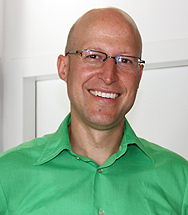"All experience, all new information, is interpreted through the schemes we already possess"
Bert Cornillie, from the University of Leuven, gave the example of the frameworks in American society that Donald Trump uses to reinforce his position

"All experience, all new information, is interpreted through the schemes we already possess," or so Bert Cornillie argued at the University of Navarra. Cornillie is a professor of Spanish Linguistics within the Master’s in Iberian and Latin American Studies at the University of Leuven. He was invited by the Institute for Culture and Society’s Public Discourse project at the University of Navarra to present research on “Linguistic modality and framing in journalistic discourse”.
Bert Cornillie reflected on the presence of subjective frameworks in public opinion, for example, "politics is broken", and wondered where they come from. As he indicated, new frameworks are created when existing schemes or concepts come together and, as a result, reinforce each other.
As an example, he illustrated politicians’ use of frameworks based on a study from George Lakoff, who is a researcher of cognitive linguistics at the University of Berkley (California). Lakoff examined how U.S. presidential candidate Donald Trump bases his discourse on two key frameworks within American society to strengthen his position: "The security that a father gives— he is authoritarian— and a cause-effect relationship, a simple, unidirectional discourse with no digressions. He insults people because, in this view, a father can do so from time to time," he argued, adding that attacking the candidate's position reinforces the framework he has created.
He argued that, "new leaders, like Trump or Le Pen, are based on these movements of schemes to develop their most radical discourse."For him, this does not equate to the frameworks in society becoming more radical, but rather the digital age has allowed access to more ideas: "Control of the media and the filtration processes previously in place are evaporating, making for a multitude of opinions, which have their own legitimacy, but that were not so readily visible before."
He also referred to a campaign in which the food industry uses the union of schemes, i.e., the “flexivore” in reaction to the rise of vegetarianism. “Being vegetarian is seen as a breakthrough, but it affects the food industry because it causes a decrease in demand for meat." Hence the concept of “flexivore” arises, joining the scheme of healthy eating (it’s not good to eat meat every day) with the promotion of local production (which reinforces the idea of eating meat, but from a nearby geographical area). "By sharing basic schemes from other frameworks, the framework itself becomes more popular," Cornillie explained.
Dialogue between linguistics and communication studiesBetween 2010 and 2016, Bert Cornillie has analyzed six journals with high impact factors in the field of linguistics and journalism, including Journalism, Journalism Studies, Journal of Pragmatics and Cognitive Linguistics. He attempts to uncover how modality and framing are analyzed from these two disciplines.
From his experience, the researcher highlights the need for collaboration between linguists and experts from communication. "Linguistics benefits from the broad view of discourse, the development of themes, discursive lines and, above all, the sociological constellation of positions." In turn, "communication studies can inspire refined analysis of linguistic forms," he concluded.
